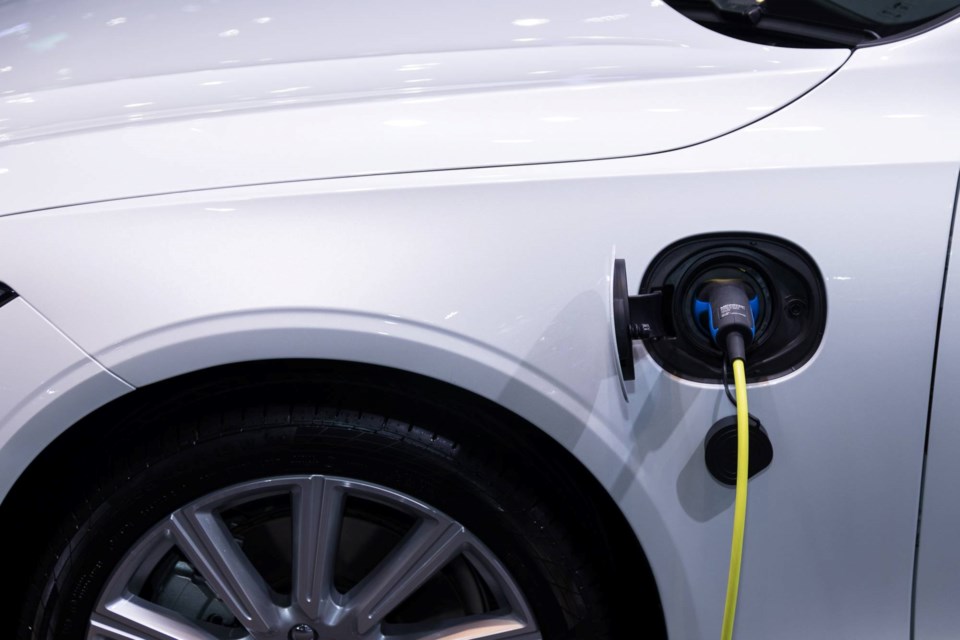NEWS RELEASE
GOVERNOR'S OFFICE
*************************
Gov. Gretchen Whitmer today signed Executive Directive 2023-5, which will transition the State of Michigan’s fleet to zero-emission vehicles (ZEVs). Getting this done will reduce air pollution, help boost demand for Michigan-made electric vehicles, and lower costs of fuel and maintenance.
“Michigan automakers are on the cutting-edge of the world’s switch to zero emission vehicles, and with today’s executive directive to transition our state-owned fleet by 2040, the State of Michigan is leading by example,” said Whitmer. “With today’s executive directive, I am directing state agencies to begin the process of converting vehicles owned and operated by the state to ZEVs by 2033 for light-duty vehicles and 2040 for medium and heavy-duty vehicles. Getting this done will help drive demand of Michigan-made electric vehicles, lower gas and maintenance costs for the state since ZEVs cost far less to fuel and maintain and reduce air and noise pollution in our communities.”
State Fleet Conversion Executive Directive
The executive directive instructs Michigan state departments and agencies to:
- prioritize ZEVs in their fleet,
- prioritize transitioning vehicles that travel the most miles first,
- prioritize transitioning vehicles in communities historically impacted by higher pollution,
- install electric vehicle supply equipment, including publicly accessible chargers, in high-density areas, and
- establish clear exemption criteria for specific fleet vehicles and offer alternative emission reduction options including hybrids.
The full executive directive can be found here.
“The UAW applauds the State of Michigan for showing that the electric vehicle transition doesn’t have to be a race to the bottom,” said Shawn Fain, International President of the United Auto Workers. “We encourage the state to purchase union-made EVs for all state vehicles, giving America’s autoworkers their fair share of this historic moment for the American auto industry. On behalf of our 400,000 active members and 600,000 retirees, I want to thank and commend Governor Whitmer on notching another win for the working class.”
“Moving our state vehicles to clean energy propulsion systems is a significant step towards Michigan’s leadership as a clean energy economy,” said Glenn Stevens Jr., Executive Director, MICHauto; Vice President, Automotive and Mobility Initiatives, Detroit Regional Chamber. “Our state fleet will be a leading example of zero-emission vehicles on our roads and will help set a precedent for all public and personal transportation to move in this direction.”
“Today’s Executive Directive for electrifying the state’s vehicle fleet is a big step forward in meeting the Governor’s climate goals as well demonstrating leadership on the future of Mobility,” said Charles Griffith, Climate and Energy Program Director at the Ecology Center. “We hope the state’s commitment to transition to electric vehicles will also encourage other public and private fleet operators to make the decision to go electric, saving money on fuel costs and cleaning the air at the same time."
Governor Whitmer’s Mobility Electrification Leadership
- Michigan projected to “dominate” battery manufacturing; top state for electric vehicle investments.
- Created the Office of Future Mobility and Electrification to coordinate mobility-related initiatives and implement the ‘MI Future Mobility Plan,’ a statewide mobility strategy.
- Partnered with the City of Detroit, Ford, and Google on Michigan Central, a mobility innovation hub to attract and retain skilled talent and high-growth companies in Detroit.
- Launched the EV Jobs Academy, Mobility Talent Action Team, and MI EV Scholars Program to prepare Michigan’s workforce for electric vehicle sector jobs.
- Funded a $130 million project at the University of Michigan for electric vehicle research.
- Led REV Midwest, a 5-state compact, to roll out regional charging infrastructure.
- Announced the Lake Michigan Circuit: America’s best electric vehicle road trip.
- Announced CAVNUE, a corridor for connected and autonomous vehicles.
- Piloted new inductive charging technology that charges vehicles while in motion.
- Announced a Smart Parking Lab to test mobility, logistics, and charging technologies.
- Announced a Binational EV Corridor, the country’s first cross-border electric vehicle corridor.
- Partnered with Rivian to install electric vehicle chargers in Michigan State Parks and announced grants to 3 companies pioneering electrification of outdoor recreation.
Governor Whitmer’s Clean Energy & Climate Leadership
Last week, Whitmer signed historic clean energy and climate legislation into law:
- 100% Clean Energy Standard: Senate Bill 271 sponsored by Senator Erika Geiss (D-Taylor) establishes a 100% clean energy standard for Michigan. By 2040, Michigan will produce all its energy from clean sources.
- Improving Energy Efficiency: Senate Bill 273 sponsored by Senator Sam Singh (D-East Lansing) improves energy efficiency and waste reduction programs to drive down costs for families and small businesses.
- Fighting for Workers: Senate Bill 519 sponsored by Senator Sam Singh (D-East Lansing), establishes the Office of Worker and Community Economic Transition, which will work with workers and communities impacted by the ongoing switch to clean energy and electric vehicles to ensure no one is left behind.
- Streamlining Clean Energy Projects: House Bill 5120 sponsored by Representative Abraham Aiyash (D-Hamtramck) and House Bill 5121 sponsored by Representative Ranjeev Puri (D-Canton) bolster the Michigan Public Service Commission by authorizing them to streamline permitting of utility-scale clean energy the same way they can currently do so for other sources of energy. This will drive billions of dollars of federal and private investment in Michigan, creating good-paying local jobs and helping the state meet its clean energy goals.
- Prioritizing Local Communities: Senate Bill 502 sponsored by Senator Sue Shink (D-Northfield Township) authorizes the MPSC to consider climate and equity in their regulatory decisions so we can prioritize the health and well-being of our communities as we expand energy production. Senate Bill 277 sponsored by Senator Kristen McDonald Rivet (D-Bay City) protects farmers’ rights to host solar projects on their own land.
*************************



